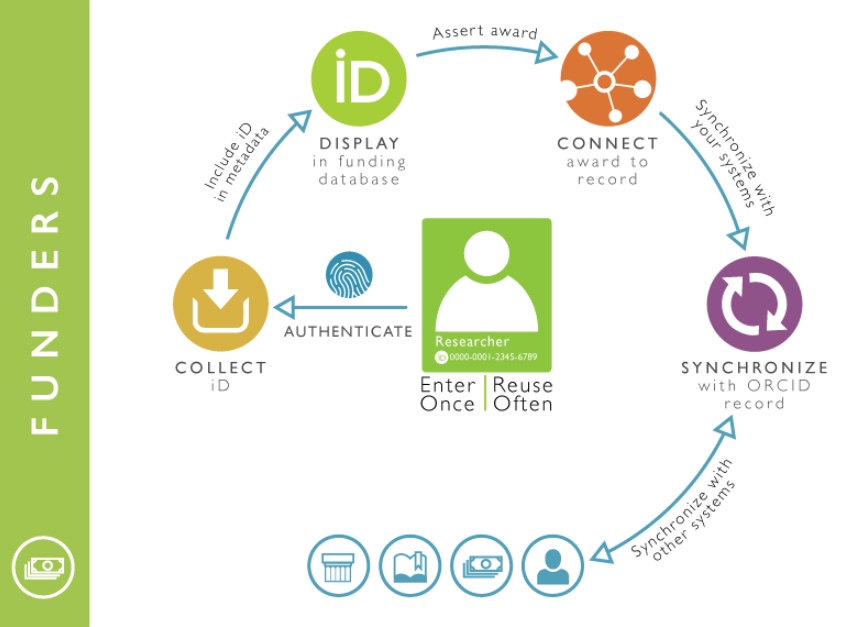 Research funding organizations have been involved with ORCID since the very beginning, with both the US National Institutes of Health (NIH) and the UK’s Wellcome Trust among our launch partners and among our 27 founding members, back in 2012.
Research funding organizations have been involved with ORCID since the very beginning, with both the US National Institutes of Health (NIH) and the UK’s Wellcome Trust among our launch partners and among our 27 founding members, back in 2012.
Engagement by the funding community has steadily increased, with functionality to connect funding to ORCID, announcements by some funders of policies requiring ORCID, as well as participation in national-level ORCID consortia. We now have 34 funder members – boosted by the recent addition of the Health Research Alliance consortium – and 21 government organizations, most of which also act as funders. These organizations are a core component of our mission and vision. Linking funding information to ORCID iDs can help to streamline and improve funding acknowledgements and reporting, and there already more than 360,000 funding items attached to ORCID records. The partnership between ORCID and funders has recently become even closer, with the ORBIT (ORCID Reducing Burden and Increasing Transparency) project kicking off shortly.
All research organizations play a role in this shared vision, collecting ORCID iDs from researchers using their systems, embedding identifiers in research information systems, and sharing authoritative information bundles with researchers. For funders, this bundle includes:
- Person = the name of the applicant and their ORCID iD
- Place = the name of the funding organization and its organization identifier
- Thing = the title of the grant and its unique identifier
By posting funded award information into grantee ORCID records, funding organizations can make it easy for researchers to share information with other systems. In turn, this, ensures that authoritative information is shared – with the researcher’s permission – as they use their iD in research systems and workflows, building trust and transparency in the research process. Funders can also use ORCID to recognize the work of reviewers.
Not only can this reduce the drudgery of form-filling for researchers, it also ensures that funder names are used in a standard way, and makes it possible for publishers to streamline the capture of funding information. This information can then be used to automate reporting processes, saving time, shortening the reporting cycle, and increasing accuracy and completeness, as described in this blog post by Wellcome Trust.
The ORBIT Project deepens our work with the funding community. ORBIT aims to increase the efficiency of grant application workflows; improve the ease of program data collection; and promote research rigor and reproducibility. There are two components to the project:
- Funder Working Group: Charged with exploring the use of identifiers in funder systems to enable information sharing, access, and accountability, through data models, policy, and communications resources
- Pilot Projects: Practical identifier-based projects to demonstrate feasibility of information sharing in funding systems.
In concert with the launch of the ORBIT project, we have updated and expanded our resource pages for funding organizations:
- NEW! ORCID for Funding Organizations
- NEW! Best Practices for Funding Organizations
- NEW! Funders’ ORCID Policies
- UPDATED! Collect & Connect for Research Funding
- UPDATED! Funding Submission System Workflow
Interested in participating in ORBIT? Would you like more information about ORCID and funding organizations? Please contact us.
